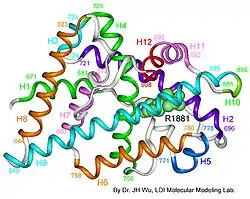متلازمة نقص الأندروجين الخفيفة
متلازمة نقص الأندروجين الخفيفة (MAIS) هي حالة تؤدي إلى ضعف بسيط في قدرة الخلية على الاستجابة للأندروجينات.[1][2][3]درجة الضعف كافية لإعاقة تكوين الحيوانات المنوية أو تطور الخصائص الجنسية الثانوية عند البلوغ عند الذكور، ولكنها لا تؤثر على تمايز الأعضاء التناسلية أو نموها. لا يتأثر نمو الأعضاء التناسلية والجنسية بشكل كبير بعدم الحساسية للأندروجينات؛[4][5][6] على هذا النحو، يتم تشخيص الإصابة بمتلازمة نقص الأندروجين الخفيفة فقط عند الذكور. النمط الظاهري السريري المرتبط بمتلازمة نقص الأندروجين الخفيفة هو عادة طبيعية للذكور مع عيب خفيف منوي أو انخفاض في الشعر الطرفي الثانوي.[6][7][8][9][10][11]
متلازمة نقص الأندروجين الخفيفة هي واحدة من ثلاثة أنواع من متلازمة نقص الأندروجين، والتي تنقسم إلى ثلاث فئات متباينة بدرجة التحصين التناسلي: يشار إلى متلازمة نقص الأندروجين الكاملة (CAIS) عندما تكون الأعضاء التناسلية الخارجية الأنثوية، ويشار إلى متلازمة نقص الأندروجين الخفيفة (MAIS)، عندما تكون الأعضاء التناسلية الخارجية من الذكور نمطياً، ومتلازمة نقص الأندروجين الجزئية (PAIS)، عندما تكون الأعضاء التناسلية الخارجية جزئياً ، ولكن ليست ممرضة بالكامل.[12][13]
| متلازمة نقص الأندروجين الخفيفة | |
|---|---|
 تنتج متلازمة نقص الأندروجين، عندما تكون وظيفة مستقبلات الاندروجين (AR) ضعيفة. البروتين AR (في الصورة) يتوسط آثار الأندروجينات في جسم الإنسان. تنتج متلازمة نقص الأندروجين، عندما تكون وظيفة مستقبلات الاندروجين (AR) ضعيفة. البروتين AR (في الصورة) يتوسط آثار الأندروجينات في جسم الإنسان. | |
| تسميات أخرى | متلازمة ضعف الذكورة |
| معلومات عامة | |
| الاختصاص | علم الغدد الصم |
| من أنواع | متلازمة عدم الحساسية للأندروجين |
انظر أيضًا
المراجع
- Hughes IA, Deeb A (December 2006). "Androgen resistance". Best Pract. Res. Clin. Endocrinol. Metab. 20 (4): 577–98. doi:10.1016/j.beem.2006.11.003. PMID 17161333.
- Galani A, Kitsiou-Tzeli S, Sofokleous C, Kanavakis E, Kalpini-Mavrou A (2008). "Androgen insensitivity syndrome: clinical features and molecular defects". Hormones (Athens). 7 (3): 217–29. doi:10.14310/horm.2002.1201. PMID 18694860.
- Quigley CA, De Bellis A, Marschke KB, el-Awady MK, Wilson EM, French FS (June 1995). "Androgen receptor defects: historical, clinical, and molecular perspectives". Endocr. Rev. 16 (3): 271–321. doi:10.1210/edrv-16-3-271. PMID 7671849.
- Giwercman YL, Nordenskjöld A, Ritzén EM, Nilsson KO, Ivarsson SA, Grandell U, Wedell A (June 2002). "An androgen receptor gene mutation (E653K) in a family with congenital adrenal hyperplasia due to steroid 21-hydroxylase deficiency as well as in partial androgen insensitivity". J. Clin. Endocrinol. Metab. 87 (6): 2623–8. doi:10.1210/jc.87.6.2623. PMID 12050225.
- Zuccarello D, Ferlin A, Vinanzi C, Prana E, Garolla A, Callewaert L, Claessens F, Brinkmann AO, Foresta C (April 2008). "Detailed functional studies on androgen receptor mild mutations demonstrate their association with male infertility". Clin. Endocrinol. 68 (4): 580–8. doi:10.1111/j.1365-2265.2007.03069.x. PMID 17970778.
- Ferlin A, Vinanzi C, Garolla A, Selice R, Zuccarello D, Cazzadore C, Foresta C (November 2006). "Male infertility and androgen receptor gene mutations: clinical features and identification of seven novel mutations". Clin. Endocrinol. 65 (5): 606–10. doi:10.1111/j.1365-2265.2006.02635.x. PMID 17054461.
- Stouffs K, Tournaye H, Liebaers I, Lissens W (2009). "Male infertility and the involvement of the X chromosome". Hum. Reprod. Update. 15 (6): 623–37. doi:10.1093/humupd/dmp023. PMID 19515807.
- Giwercman YL, Nikoshkov A, Byström B, Pousette A, Arver S, Wedell A (June 2001). "A novel mutation (N233K) in the transactivating domain and the N756S mutation in the ligand binding domain of the androgen receptor gene are associated with male infertility". Clin. Endocrinol. 54 (6): 827–34. doi:10.1046/j.1365-2265.2001.01308.x. PMID 11422119.
- Lund A, Juvonen V, Lähdetie J, Aittomäki K, Tapanainen JS, Savontaus ML (June 2003). "A novel sequence variation in the transactivation regulating domain of the androgen receptor in two infertile Finnish men". Fertil. Steril. 79 Suppl 3: 1647–8. doi:10.1016/s0015-0282(03)00256-5. PMID 12801573.
- Ozülker T, Ozpaçaci T, Ozülker F, Ozekici U, Bilgiç R, Mert M (January 2010). "Incidental detection of Sertoli-Leydig cell tumor by FDG PET/CT imaging in a patient with androgen insensitivity syndrome". Ann Nucl Med. 24 (1): 35–9. doi:10.1007/s12149-009-0321-x. PMID 19957213.
- Davis-Dao CA, Tuazon ED, Sokol RZ, Cortessis VK (November 2007). "Male infertility and variation in CAG repeat length in the androgen receptor gene: a meta-analysis". J. Clin. Endocrinol. Metab. 92 (11): 4319–26. doi:10.1210/jc.2007-1110. PMID 17684052.
- Kawate H, Wu Y, Ohnaka K, Tao RH, Nakamura K, Okabe T, Yanase T, Nawata H, Takayanagi R (November 2005). "Impaired nuclear translocation, nuclear matrix targeting, and intranuclear mobility of mutant androgen receptors carrying amino acid substitutions in the deoxyribonucleic acid-binding domain derived from androgen insensitivity syndrome patients". J. Clin. Endocrinol. Metab. 90 (11): 6162–9. doi:10.1210/jc.2005-0179. PMID 16118342.
- Gottlieb B, Lombroso R, Beitel LK, Trifiro MA (January 2005). "Molecular pathology of the androgen receptor in male (in)fertility". Reprod. Biomed. Online. 10 (1): 42–8. doi:10.1016/S1472-6483(10)60802-4. PMID 15705293.
- بوابة طب